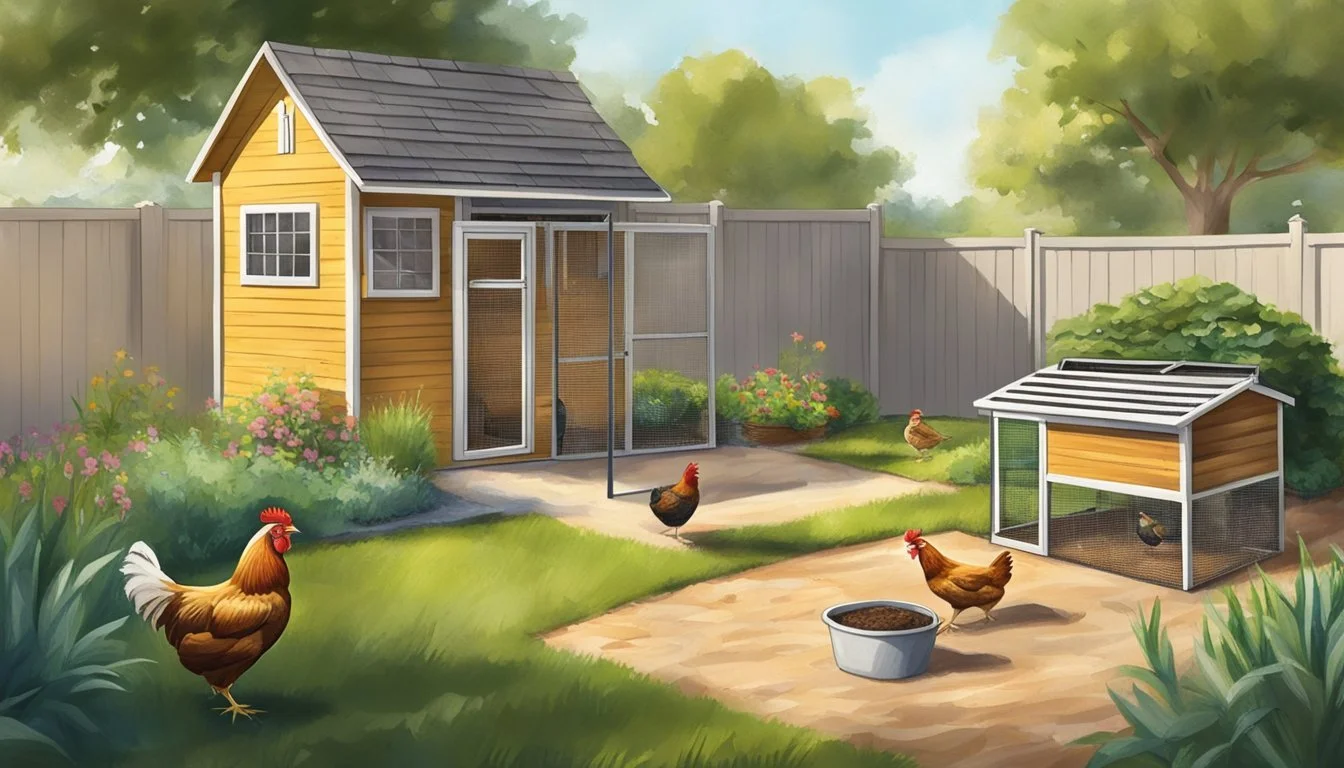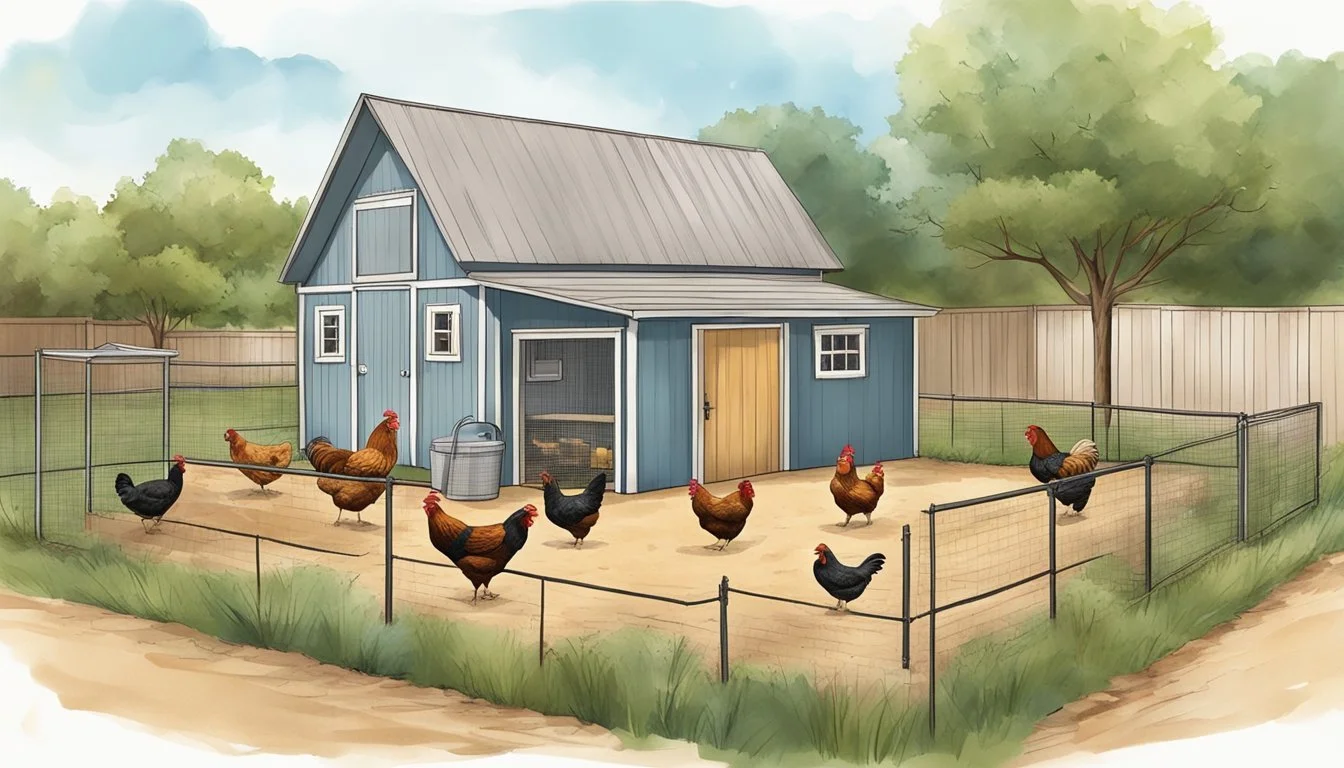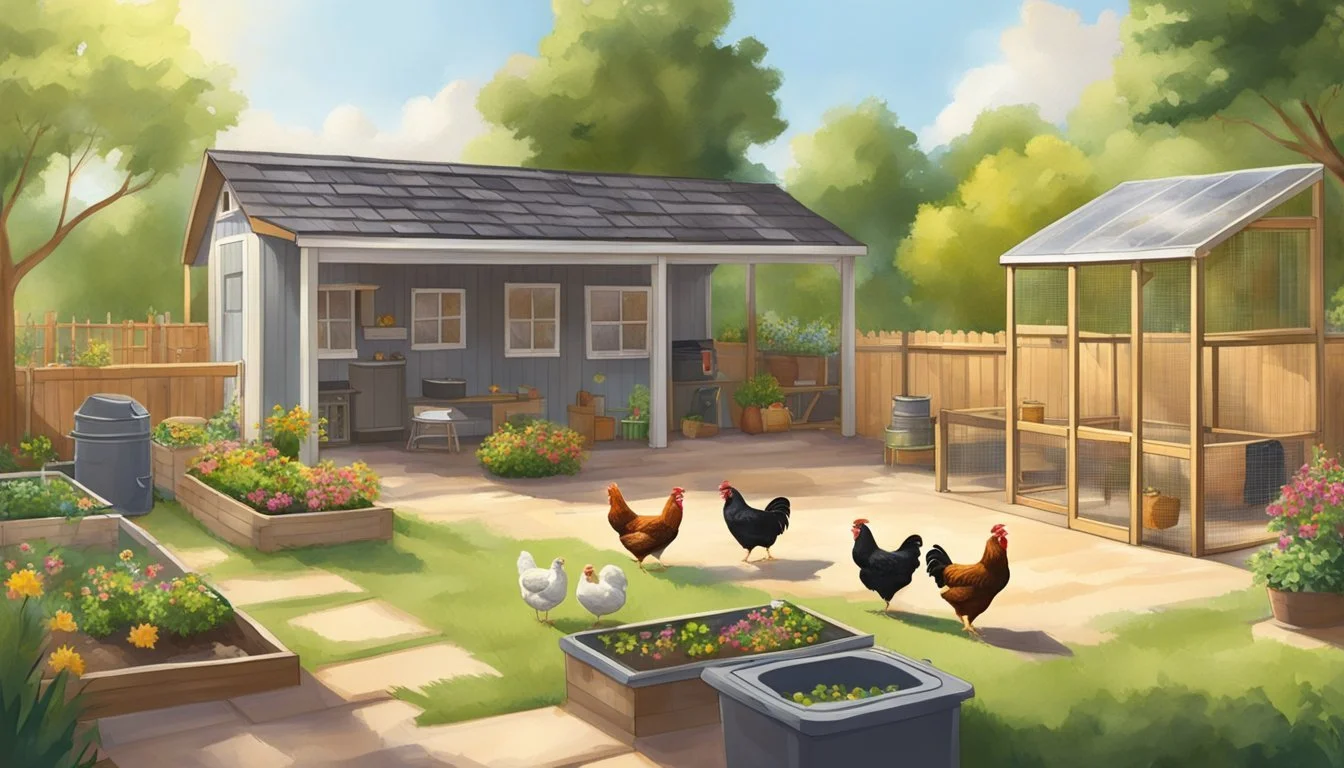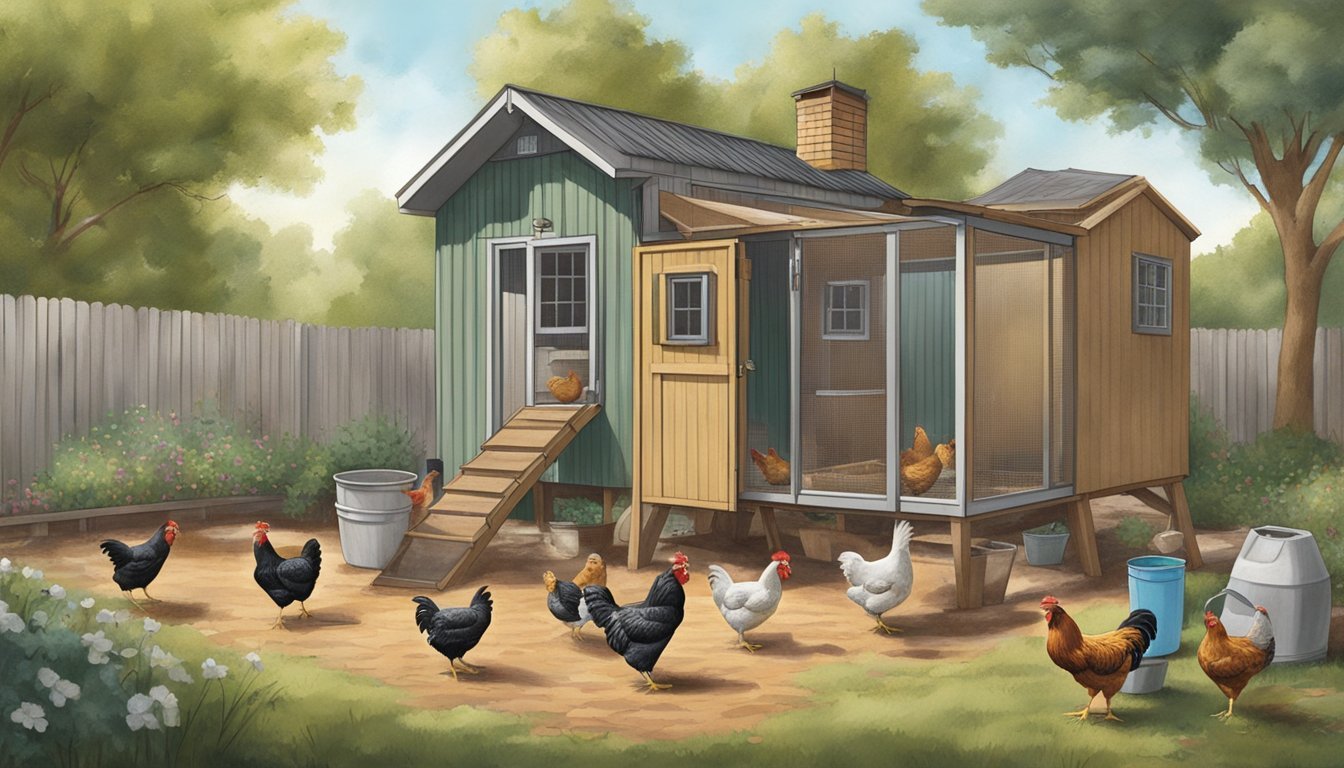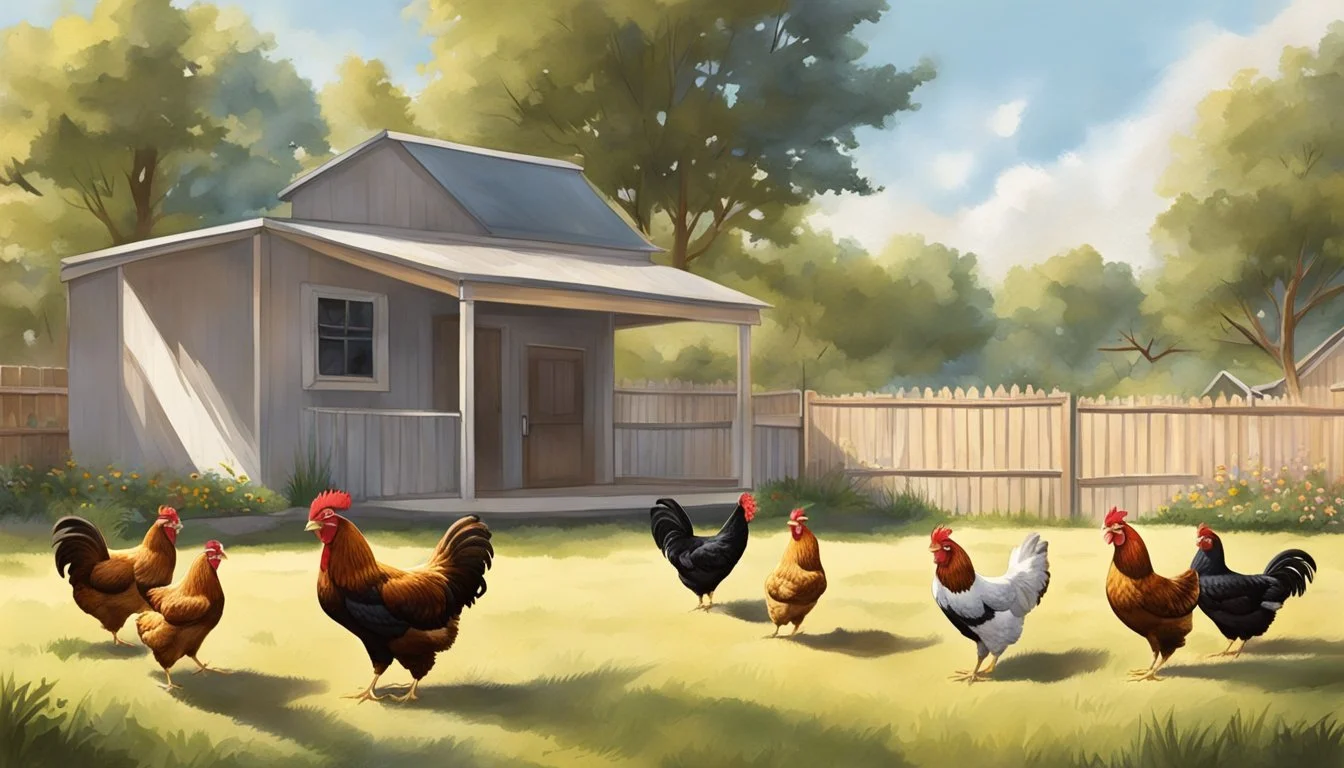Keeping Backyard Chickens in Lubbock, TX
Essential Tips for Beginners
Keeping backyard chickens has become a popular sustainable habit among residents in cities across the United States. In Lubbock, Texas, residents interested in sustainable living and fresh eggs have turned to keeping chickens in their backyards. Whether it's for waste reduction through composting or having control over their own food sources, chicken keeping meets various lifestyle and ecological goals. However, potential chicken keepers in Lubbock must navigate a set of local ordinances designed to balance urban agriculture with neighborhood harmony and safety.
The city ordinances in Lubbock stipulate that keeping chickens is permissible as an accessory use to the main residential building. This means that while residents are allowed to keep chickens, there are rules in place that need to be followed to ensure the practice does not negatively impact the surrounding community. Conditions focus on the number of chickens allowed, the type of housing provided for them, and their maintenance.
It's crucial for Lubbock citizens to be aware of the specifics regarding the housing, care, and number of chickens permitted. Ensuring adequate space for exercise, protection from predators, and access to clean food and water is not only a matter of following the law but is also important for the health and well-being of the chickens. This thoughtful approach to chicken keeping ensures that both the chickens and the community can thrive together.
Legal Framework for Raising Chickens
Raising backyard chickens in Lubbock, TX is governed by specific city ordinances which residents must adhere to. Understanding these legal structures is pivotal for any Lubbock resident considering poultry keeping.
Understanding City Ordinances
The City of Lubbock mandates that keeping chickens is permissible only in compliance with the local city ordinances and zoning laws. A distinct ordinance elucidates that no person may keep livestock within city limits unless it conforms to the rules set out by the City Council. It is essential to refer to the Lubbock Texas Chicken Ordinance for detailed information, especially about accessory uses related to the main building or structure on a property.
Comparison with Other Texas Cities
Lubbock's regulations on chicken keeping show similarities and variances when compared to other Texas cities. For instance, the city of Saginaw allows residents to keep a maximum of three female chickens with a city permit, whereas a Texas Senate Bill acknowledges the right of Texans to keep up to six hens. Some cities may impose restrictions on breeding or keeping more than six chickens, while others like Lubbock may have their distinct stipulations.
Zoning and Property Regulations
Every resident must also consider zoning and property regulations when planning to raise backyard chickens. They should ensure the chickens are kept in a secure, enclosed area that protects them from predators and allows adequate space for exercise. This aligns with the broader Texas regulations emphasizing the need for proper space, cleanliness, and access to necessities such as food and water. The enclosure or coop must meet Lubbock's city code for animal housing.
Residents contemplating raising backyard chickens in Lubbock should diligently review the most current city ordinances and zoning regulations or consult with the city officials to guarantee compliance.
Setting Up Your Backyard Coop
Setting up a backyard chicken coop in Lubbock, TX requires careful planning to ensure the hens have adequate space, are protected from predators, and have access to clean food and water.
Space and Enclosure Requirements
Each chicken needs at least 2-3 square feet of space inside the coop and 8-10 square feet outside in an enclosure to roam. It’s important that the enclosure allows chickens to exhibit natural behaviors such as scratching and dust bathing.
Indoor Space:
Minimum: 2-3 square feet per chicken
Must include space for roosting and laying boxes
Outdoor Enclosure:
Minimum: 8-10 square feet per chicken
Should provide protection from elements and allow space to roam
Protection from Predators
Lubbock coops must be reinforced to prevent predation by securing them with hardware cloth instead of chicken wire and burying it to thwart digging.
Walls & Floor: Use hardware cloth over chicken wire.
Entrance: Should close tightly with locks to secure at night.
Preventative Measures: Bury the hardware cloth perimeter underground.
Food, Water, and Sanitation
Consistent access to clean water and organic feed is necessary. Sanitation involves regular cleaning and management of litter to ensure the health of the chickens.
Feeding: Use feeders that keep organic feed dry and clean.
Watering: Provide constant access to clean water.
Sanitation: Regularly replace litter and implement proper ventilation within the coop.
Chicken Welfare and Management
When keeping backyard chickens in Lubbock, TX, it is crucial for owners to maintain a high standard of welfare to ensure the chickens are healthy, productive, and safe. Owners should prioritize disease prevention, provide an appropriate diet, and give chickens adequate space to roam.
Health and Disease Prevention
Preventing disease is essential for the welfare of backyard chickens. Regular check-ups with a veterinarian experienced in poultry health are important. The director of animal services or other city officials can provide guidance on local health regulations. Owners should monitor for signs of illness, such as changes in behavior or egg production, and maintain cleanliness to reduce disease risk.
Biosecurity measures:
Limit visitors to the chicken area.
Keep wild birds and rodents away from feed and water.
Vaccination: Some vaccines may be recommended depending on local disease risks.
Quarantine: New birds should be quarantined for at least 30 days before joining the existing flock.
Nutrition and Diet
Chickens require a balanced diet to stay healthy and lay quality eggs. Provide commercial feeds that meet nutritional requirements, which typically contain grains, protein, vitamins, and minerals. Access to fresh food and water is critical; both should be available at all times.
Feeding schedule: Timed feedings can help keep chickens healthy and manage waste.
Treats and scraps: Offer in moderation and ensure they are suitable for poultry.
Exercise and Roaming Space
Exercise is important for the physical health and well-being of chickens. Enclosures should offer enough space for chickens to walk, stretch their wings, and engage in natural behaviors.
Roaming area: Minimum of 10 square feet per chicken in the roaming area.
Enclosure: Should protect from predators and provide shade, shelter, and exercise space.
Adequate space helps prevent stress-related behaviors and promotes overall health.
By adhering to these welfare and management guidelines, backyard chicken owners in Lubbock can create a thriving environment for their poultry.
Community Considerations
When keeping backyard chickens in Lubbock, Texas, residents must consider how their activities affect their community. This includes managing potential nuisances and maintaining neighbor relations, as well as addressing public safety concerns and disease control measures.
Nuisance and Neighbor Relations
Residents must ensure that their chicken-keeping practices do not become a public nuisance to neighboring residences, schools, or churches. Key concerns include noise, such as frequent or loud crowing, and odor from improperly maintained coops. Residents should be conscientious about:
Coop placement: Coops should be situated away from property lines, minimizing the impact on neighbors.
Noise management: Roosters are more likely to create noise issues; therefore, keeping only hens may be advisable.
Odor control: Regular cleaning of the coop is essential to prevent offensive smells.
Public Safety and Disease Control
Concerns for public safety relate to the potential spread of diseases that could affect other animals or humans. In Lubbock, poultry keepers are responsible for:
Disease prevention: Regular health checks and proper veterinary care for chickens can mitigate the risk of disease spread.
Sanitation: Proper coop cleaning and waste disposal are critical to control the spread of pathogens.
Limiting access: Preventing chickens from roaming freely reduces the risk of accidents and interactions with neighbors or local wildlife.
By adhering to these guidelines, residents of Lubbock can help ensure that their practices are safe and respectful within their community.
Administrative Processes
In Lubbock, Texas, backyard chicken enthusiasts must adhere to specific administrative processes to ensure they comply with local ordinances. These processes include obtaining the necessary permits and being aware of penalties for non-compliance.
Permits and Multipet Licenses
Residents must obtain a chicken permit to keep chicken hens within the city limits of Lubbock. This permit ensures that the keeping of chickens is in conformance with the city's zoning ordinances. Additionally, in households with more than four animals, a multipet permit may be required.
Chicken Permit Requirements:
Conformance with zoning ordinances.
Adequate space and secure enclosures.
Access to food and water.
Multipet Permit:
Necessary for more than four animals.
Includes a set fee for issuance.
Penalties for Non-Compliance
Failure to comply with the Lubbock Texas Chicken Ordinance can lead to penalties. These can include fines, particularly if residents exceed the allowed number of chickens without a permit or if their enclosures do not meet the standards set by the ordinance.
Fines:
Levied for ordinance violations.
Amount varies depending on the nature of the violation.
Residents must ensure they understand and follow these processes to avoid the risk of penalties and to promote the welfare of their backyard chickens. Compliance with these rules is essential for the responsible keeping of chickens in Lubbock, Texas.
FAQs and Resources
Raising Chickens in Lubbock
Is it legal to keep chickens in Lubbock, TX? Residents are allowed to keep up to four hens, but roosters are not permitted. Individuals wishing to own more than four hens may apply for a variance from the Planning and Zoning Board.
Do I need a permit to keep chickens? In some places, such as the City of Saginaw, permits are required. Check the local Lubbock ordinances to determine if a permit is needed.
Protecting Your Flock
What predators should I be aware of? Common predators in rural and urban areas include cats, dogs, and birds of prey. Ensure that your chicken coop is secure.
Backyard Flock Considerations
Can I raise chicks in Lubbock? Yes, you can raise chicks, but remember that Lubbock limits the number of chickens to four hens.
Are ducks or turkeys allowed as backyard pets? Lubbock ordinances specifically mention chickens. For other fowl, check the latest city ordinances.
Are backyard chickens allowed in rural areas? In unincorporated areas of Texas, there are fewer regulations. Typically, no specific limits on chickens apply in these areas.
Can I raise chickens along with other animals like rabbits? Chickens can coexist with other pets like rabbits, but they should have their own secure space to prevent potential conflicts.
Additional Resources
For more detailed information, residents should refer to:
Lubbock Code of Ordinances: For specific legal text regarding the keeping of chickens.
Local Extension Office: For educational resources on keeping and caring for backyard poultry.
Online Communities: Forums such as BackYard Chickens provide valuable advice from experienced poultry keepers.
Remember to verify any updates to ordinances or regulations with the City of Lubbock to remain compliant.
Conclusion
Residents of Lubbock, Texas, are permitted to raise backyard chickens, provided they adhere to specific regulations that align with both city zoning ordinances and Texas state law.
Key requirements include:
Chickens must be kept as accessory use to the main building.
Residents are allowed a certain number of hens without roosters, to minimize noise.
Livestock keeping within city limits must conform to specific city ordinances.
Senate Bill 1620 allows all Texans to keep up to six hens; however, local municipalities may impose additional restrictions:
Limitation on the total number of chickens.
Prohibitions on breeding.
Restrictions on raising more than six chickens.
For those considering raising backyard chickens in Lubbock, they should:
Verify local zoning laws for any updates.
Ensure coops meet size and location requirements.
Keep the coop clean to deter pests and maintain hygiene.
It is imperative for potential chicken owners to stay informed about the latest ordinances and guidelines, as regulations may change. This ensures the welfare of the chickens and maintains good neighborhood relations.

